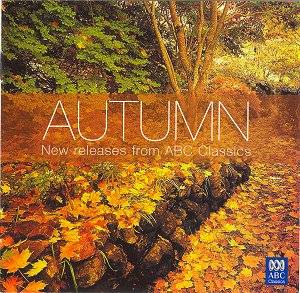Normally I can’t be doing with samplers like
this as it’s usually a ploy by magazines which want to be seen
to be offering a free disc. There’s nothing I find more frustrating
than a disc of bleeding chunks torn from their context, and I
can never imagine buying a disc based upon hearing a disconnected
fragment – maybe I’m unusual. However, I make an exception here
because of its provenance. I’ve always had a soft spot for Australian
films as they invariably have more interesting storylines that
are dealt with more imaginatively than most of what Hollywood
can offer. For that reason I was intrigued to know what a country
so far away from Europe and America is doing to satisfy what must,
considering the size of its population, be a relatively small
number of serious music enthusiasts that must surely constitute
any Australian label’s major market as the availability of Australian
recordings, in Britain at any rate, is new to me. What I discovered
was a delight and I hope that more of the country’s recordings
become available here as they certainly deserve to be if this
sampler is anything to go by.
First off is a sympathetic reading of "Auf
dem wasser zu singen" by Franz SCHUBERT
(1797-1828), transcribed for piano by Liszt, played by
Stephanie McCallum, from "The Liszt Album".
On track 2 there was a real discovery in the
shape of New Zealander Teddy Tahu Rhodes a bass-baritone, singing
an aria from "The Marriage of Figaro" by Wolfgang
Amadeus MOZART (1756-1791). What a superb voice, rich
and colourful, and one that is bound to make waves in Europe and
the USA once he becomes better known. The disc it comes from is
entitled "Mozart:Arias and Orchestral Music" – couldn’t
they have found enough to make the whole disc centred around him?
The third track is the third movement from Trio
No.12 in E Minor, Hob.XV:12 by Joseph HAYDN
(1732-1809), that left me wishing I could hear the
whole work since the Ensemble of the Classic Era, playing on period
instruments, seemed to have it so wonderfully under control.
Australia’s first ever recording of the Messiah
by George Frideric HANDEL (1685-1759)
is shown off with "for unto us a child is born",
and is full of delight and an obvious focussed determination to
make this historic event a very telling one indeed. I noted that
Teddy Tahu Rhodes (see track 2 above) is one of the soloists so
this is a recording I shall be seeking out.
A beautifully played extract from Sonata for
Clarinet and Piano in F Minor, Op.120, No.1, by Johannes
BRAHMS (1833-1897) with Deborah de Graff (Clarinet) and
Len Vorster (Piano) made up track 6.
Jumping forward to track 11 there is a charming
performance by pianist Scott Davie of "Lilacs" by
Sergei RACHMANINOV (1873-1943).
The liner note said that Mr Davie is a Rachmaninov scholar and
this showed in the tone and colour he expressed in this miniature.
Sara Macliver gives a spirited rendition of "Ragion
nell’alma siede" from Act 1 of "Il mondo della luna"
by HAYDN. Her voice seems perfect
for repertoire such as this, with a natural sound that is both
charming yet powerful. I noticed that she too is a soloist on
the aforementioned recording of the Messiah, so another good reason
to locate it.
Track 13 is interesting as it is from a recording
of the rarely heard chamber version of "Lieder das fahrenden
gesellen" by Gustav MAHLER (1860-1911),
arranged by Schoenberg in 1920, and sung by baritone Jeffrey Black.
The liner note says it is coupled with the World Premiere of the
chamber version of Mahler’s 4th. Symphony, which sounds
like a fascinating prospect.
I’d like to pick out two more tracks that I particularly
enjoyed – Brahms’ Piano Trio in C Minor, Op.101, from which
the Maquarie Trio play the Andante Grazioso on track 14 and
the "The Nightingale and the Two Sisters" by Percy
GRAINGER (1882-1961). This is from a disc which also
includes music by Vivaldi, Saint-Saëns, Granados and Respighi,
all dedicated to a celebration of the nightingale – what a delightful
idea for a theme. The extract was only one of a number of new
musical experiences I had from this disc.
Other tracks include music by Khachaturian and
John Rutter, film music by Cezary Skubiszewski, a lovely Irish
air by James Scott Skinner (another discovery), Michael Nyman
(from an animated version of The Diary of Ann Frank, a
bizarre concept!), as well as Jerome Kern, Edith Piaf singing
"La Vie en Rose" and even Bing Crosby and Louis Armstrong’s
version of "Gone Fishin’".
I counted 7 different orchestras and chamber
ensembles on this record so music is clearly alive and well in
Australia!
Steve Arloff

![]() ABC CLASSICS 472 907-2
[71:43]
ABC CLASSICS 472 907-2
[71:43]